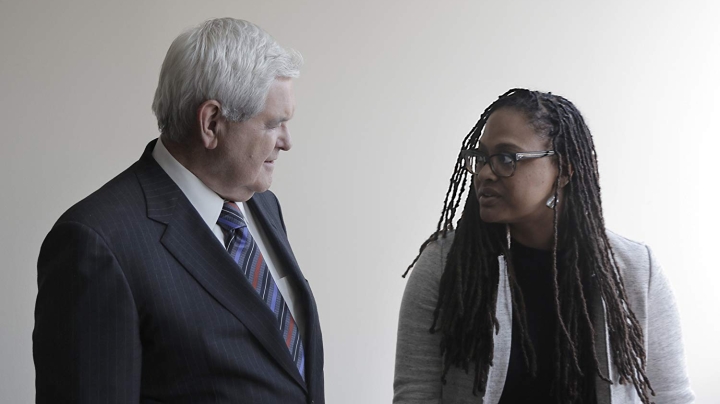Year: 2016
Runtime: 100 Minutes
Director: Ava DuVernay
Writer: Ava DuVernay and Spencer Averick
Stars: Melina Abdullah, Michelle Alexander, Cory Booker, Angela Davis, Malkia Cyril
By Akie Kutsunai
Documentaries present a formidable challenge. Even after meeting the significant demands of research, including excellent interview skills, the filmmaker faces a new test: how might they create a cohesive narrative that will captivate their audience? Ava DuVernay’s attention to detail and design makes “13th” sobering, enraging, and ultimately energizing documentary.
What She Said:
“13th tells us black Americans are not irrational. They are not making up racism or targeted arrests and police violence. 13th tells us black people are not crazy.”
Soraya Nadia McDonald, The UndefeatedTwitter: @SorayaMcDonald
Met with widespread critical acclaim, the film seeks to illuminate the Thirteenth Amendment and follows consequences that reverberate well beyond the Jim Crow era. The dynamic camera moves through photographs and around experts during interviews, and extensive use of voiceover builds a deliberate pace. DuVernay (@ava on Twitter) directed, co-wrote, and co-produced the film, and she has been vocal about Netflix’s role in her ability to bypass the traditional studio system. The monochrome black and sepia tones matches many infographics, older photos, and film footage. Text is seamlessly incorporated and manipulated to fill the space, often to heartbreaking effect. Spence Averick’s editing invites the audience to consider the relationship between seemingly disparate images: a black-and-white modern American flag fades into the Brooks slave ship diagram, which is in turn subsumed into the background for the text of the amendment itself.

The meat of the Thirteenth Amendment reads: “Neither slavery nor involuntary servitude, except as punishment for a crime whereof the party shall have been duly convicted, shall exist within the United States, or any place subject to their jurisdiction.” The text appears white on a black background, but when the clause “except as punishment for a crime” is highlighted in white, those letters switch to black. This stark imagery may seem heavy-handed, but by the end of the film, these design choices visually underscore the bleak realities of racial politics in American capitalism.
What She Said:
“The latest film from acclaimed Selma director Ava DuVernay is a much-needed, sobering punch to the face that eloquently contextualizes the current state of America and one of its most important issues.”
Kristen Yoonsoo Kim, ComplexTwitter: @kristenyoonsoo
Now, a general content warning. Documentaries often explore polarizing issues; here, DuVernay maintains an unflinching look at racial violence in the United States. Graphic images are featured throughout, including footage from prisons, and body and dash cameras. I found this to be overwhelming but instructive, and I think it gives an excellent clue about this film’s ideal audience. DuVernay seeks to capture the gaze of people who would normally disengage and look away, but thanks to Netflix, the audience is ever-present.

The overarching narrative focuses primarily on recent history leading up to the 2014 Ferguson uprising. DuVernay initially sets a brisk pace and moves fluidly through the Southern Reconstruction in the aftermath of the American Civil War. She wisely dwells on D.W. Griffith’s “The Birth of a Nation” as the first moment when black beastiality and criminality were codified in the wider public consciousness. I was reminded of Shudder’s excellent documentary “Horror Noire”, which also explores the impact of the first American blockbuster being a piece of white supremacist propaganda.
What She Said:
“Angry and urgent, DuVernay’s unflinching study of the mass incarceration of Black people in the US is one of this year’s timeliest films.”
Tomris Laffly, Film School RejectsTwitter: @TomiLaffly
DuVernay slows the pace as the narrative enters the 1970s, with more granular details about the War on Drugs, the Central Park Five, and escalating police violence. Experts run the gamut from professors, activists, lawyers, lawmakers, and in one memorable instance, a lobbyist. While he is introduced as a representative of ALEC, a “conservative council” that champions innovation and the free market, his function is to represent corporate interests via state-level legislation. DuVernay trusts her audience to draw their own conclusions, especially about the alarming discussion about the future of incarceration through GPS monitoring.

When ALEC claims it has shifted its focus to “pure economic issues”, DuVernay seizes this opportunity to explore the realities of prison labor and the near-insurmountable economic obstacles faced by felons who have left prison. She also examines the new focus on immigrants, with measures such as Arizona’s S.B. 1070 criminalising Latino populations. Footage of Trump rallies intercut with white mobs attacking black Civil Rights protestors paint a harrowing picture of racial violence echoing from our past into our present.
Ultimately, DuVernay points towards a hopeful future. New groups, like Black Lives Matter, have drawn attention to police brutality as the new face of racial violence; they also point to enduring questions of inequality and human rights. The photos playing with the closing credits show happy, thriving black families. We have been invited to make those photos a reality, and to join in the work that has already begun.
Rating: Five out of Five Stars
The Extra Bits:
Where to watch:
Netflix: Stream
Who to follow:
Ava DuVernay @ava


3 thoughts on “ITOL Top 50 Films of the Decade, Entry No. 11: 13th”